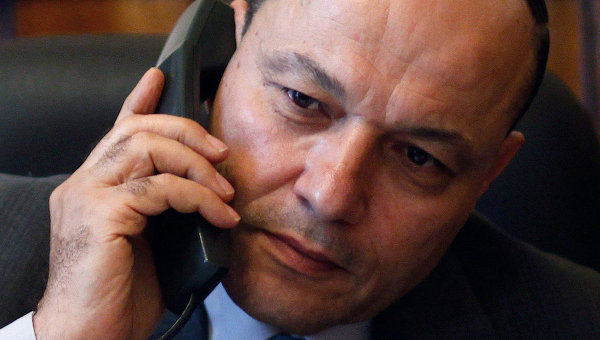
(AFP PHOTO / KHALED DESOUKI)
Jailed Canadian-Egyptian journalist Mohamed Fahmy called on his government to do more to secure his release, in a statement issued through his lawyers on Thursday.
Canadian Foreign Minister John Baird met with his Egyptian counterpart Sameh Shoukry on Thursday and discussed, in part, the jailed Al Jazeera journalists. Baird’s meeting with his Egyptian counterpart was not expected to result in an immediate resolution to the issue of the jailed journalist.
Baird himself stated: “I wasn’t naive to suggest that I would come and the situation would be resolved,” according to Canadian broadcasting agency CBC News.
Fahmy was arrested along with his two colleagues, Egyptian Baher Mohamed and Australian Peter Greste, while they were working for Al Jazeera English in December 2013. The journalists are accused of spreading false news and supporting Egypt’s outlawed Muslim Brotherhood.
The three received sentences between seven and ten years in prison each. Egypt’s Court of Cassation accepted on 1 January an appeal filed in the case of the three jailed journalists, and ordered a retrial.
In his statement, issued by his lawyers Amal Clooney and Lorne Waldman, Fahmy said: “My situation and the ongoing legal limbo that I am enduring affects all Canadians who are in the Middle East because it shows that anyone, regardless of how innocent, can become a victim of the political turbulence here.”
“Canada and Egypt have friendly relations and so I hope you will continue to advocate until the diplomatic process results in my release,” he added.
His lawyers, Clooney and Waldman, thanked the Canadian government for its efforts, but also expressed disappointment “that nothing more concrete was announced after the meeting and we hope that the Canadian government is resolved to continue the diplomatic process until Fahmy is released”.
President Abdel Fattah Al-Sisi approved a law in November that allows him to deport foreign defendants to their home countries before a court issues a final verdict against them. The law gives the president the power to deport them when it is in “the state’s interests”.


